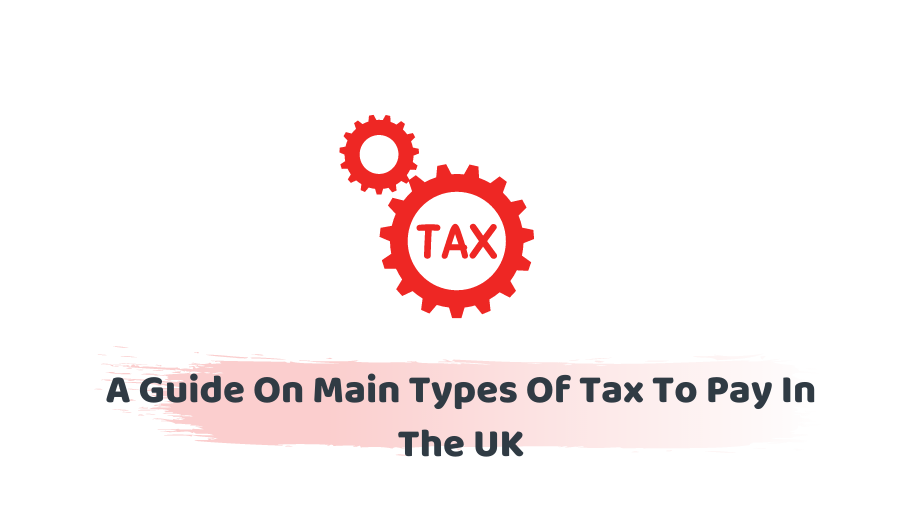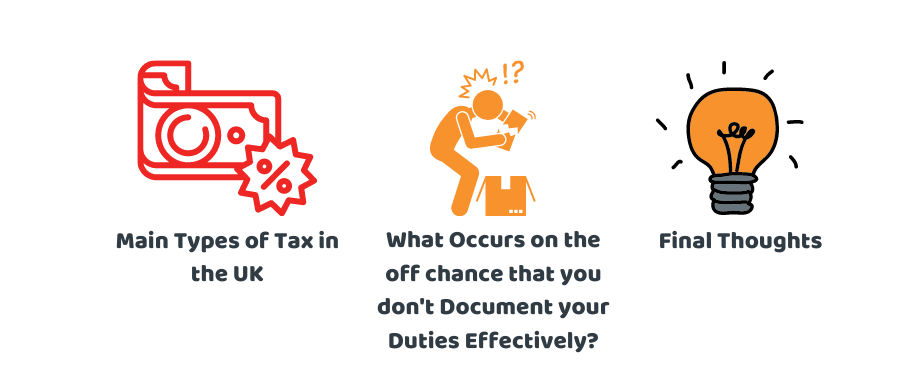The UK has had the longest duty code on the planet since 2009 so you’d be pardoned for assuming it’s profoundly mind-boggling, however indeed, the framework is moderately clear. At the point when you pay any of the types of tax in the UK, it might possibly include making installments to something like three distinct degrees of government: the HMRC (Her Majesty’s Revenue and Customs), regressed governments, and the local government.
The duty year is additionally some of the time alluded to as the Fiscal Year and runs from April sixth until April fifth in the ensuing year. Moreover, in this article, we will cover the following:
- Main Types of Tax in the UK
- What Occurs on the off chance that you don’t Document your Duties Effectively?
- Final Thoughts
The Main Types of Tax in the UK:
There are six types of tax in the UK, which are:
Personal Tax:
This is the duty collected straightforwardly on close-to-home pay. The measure of annual expense you pay relies upon two things:
- The amount of your payment is over your Personal Allowance.
- The amount of your pay falls inside each duty band.
Your available pay isn’t equivalent to your absolute pay since citizens are permitted to procure a specific sum before they begin to be burdened. This is known as a Personal Allowance, which remains at £11,500, which means you just need to start paying duties once your pay surpasses this sum. This table shows how much personal expense you’re relied upon to pay contingent upon the amount you acquire.
You might have the option to guarantee annual expense reliefs, which means you settle less personal duty. The GOV.UK site has more data on guaranteeing annual assessment reliefs.
Already have an accountant in London? Switching to ACCOTAX is a seamless & hassle-free process.
National Insurance Commitments:
You pay this to fit the bill for specific advantages and State Pension. Anybody more than 16, procuring £157 or all the more every week, or is independently employed and has a benefit of more than £6,025 a year is relied upon to pay National Insurance.
There are distinctive National Insurance classes meaning not every person pays a similar sum; your work status and your income assume an unequivocal part, just as on the off chance that you have any holes in your National Insurance record.
Value Added Tax (VAT):
Tax is a consumption charge and is the third-biggest wellspring of government many earnings expense and National Insurance.
In this classification, you’ll discover merchandise like cocktails, chocolate, prams and pushchairs, and taxi charges. There’s a diminished pace of 5% exacted on kids’ vehicle seats, power, gas, warming oil, and strong fuel, and versatility helps for the old, in addition to other things.
The zero evaluated items incorporate books, meat and poultry, foods grown from the ground, and family water, and so forth There are different labor and products that are absolved from VAT or are outside the framework.
Excise Duties:
This is one of the types of tax that is charged on things like liquor, tobacco, wagering, and vehicles just as the maker of this merchandise is being charged. Extract obligations are typically forced notwithstanding a backhanded assessment like VAT and in the UK.
A different tax document from the VAT one should be filled in. The extract charge is remembered for the last deal cost of the item, implying that the shopper pays by implication.
The extract is utilized as an obstruction towards three general classes of mischief:
- Wellbeing chances from manhandling poisonous substances for example tobacco or liquor.
- Natural harm for example petroleum derivatives.
- Socially harming/ethically offensive action for example betting or requesting.
Interested in ACCOTAX – Accountants in London? Why not speak to one of our qualified accountants? Give us a call on 0203 4411 258 or request a callback. We are available from 9:00 am – 05:30 pm Monday to Friday.
Enterprise Tax:
This type of tax is charged on the profit of a company so you’ll need to pay in case you’re working together as:
- A restricted organisation
- An unfamiliar organisation with a UK branch or office
- A club, co-activity, or other unincorporated affiliation for example a games club
From first April 2017, the typical pace of organization charge is 19%, however, this might tumble to 17% in the following not many years.
Preceding this, the partnership charge relied upon the size of the business benefits. This duty can be confounding as it should be paid before you document your organization’s government form, which leaves numerous organizations with two bookkeeping periods, making it harder to keep an outline.
Stamp Duty:
At present, the SDLT limit is £125,000 for private properties and £150,000 for non-private land and properties.
In case you’re buying your first home, you could be qualified for a rebate or even compensation no assessment at all if:
- The price tag is £500,000 or less.
- You, or anybody you’re purchasing with, are a first-time purchaser.
What Occurs on the off chance that you don’t Document your Duties Effectively?
HMRC doesn’t have to think about pay that you’ve effectively paid expense on, however in the event that you acquired other available pay, you need to pronounce it in a Self Assessment government form.
This pay might come from selling property, leasing property, or any work you’ve accomplished for yourself, for example, selling merchandise on the web. In the event that it surpasses your Personal Allowance sum, you should pay the charge on it.
On the off chance that you get a Tax Return, you should return it else you will be fined and the HMRC might wind up giving you an expected duty charge (‘assurance’).
This bill will remain until you send in the finished Tax Return. A late recording will bring about a punishment regardless of whether no duty is owed. In extraordinary conditions, a higher punishment could wind up being a similar sum as the assessment you owe.
Final Thoughts:
One perspective that makes the types of tax UK particularly intriguing is that companions are treated as discrete substances and are in this manner burdened as people, in spite of the fact that there are a couple of exemptions. We hope this article helped to develop a better understanding of the types of tax in the UK.
Can’t find what you are looking for? why not speak to one of our experts or request a callback and see how we can help you are looking for.






















































